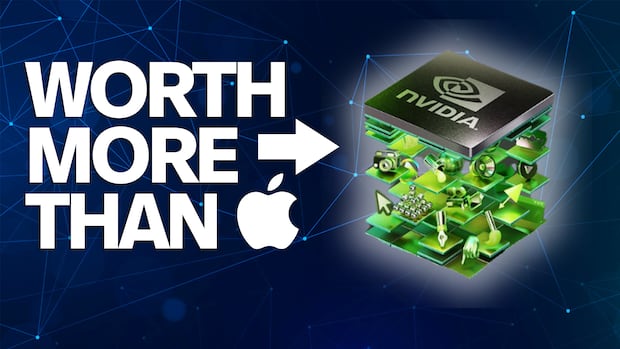Nvidia invests $5 billion US in stake and chip partnership with Intel

Nvidia said on Thursday it would invest $5 billion US in Intel, throwing its heft behind the struggling U.S. chipmaker just weeks after the White House engineered an extraordinary deal for the U.S. government to take a massive stake in the company.
The stake instantly will make Nvidia one of Intel's largest shareholders, giving it roughly four per cent or more of the company after new shares are issued to complete the deal.
Nvidia's support represents a new opening for Intel after years of turnaround efforts at the famed U.S. manufacturer failed to pay off, and it triggered a 30 per cent jump in Intel's shares in pre-market action.
The company — once the chip industry's flagbearer that claimed to put the "silicon" in Silicon Valley — appointed a new CEO, Lip-Bu Tan, in March.
He came under fire from U.S. elected officials, including U.S. President Donald Trump, who called for him to resign due to concerns about his connections with China.
That led to a swiftly arranged meeting in Washington that ended with Intel's unusual arrangement to give the U.S. government a 10 per cent stake in the company.
Nvidia, whose must-have chips are powering a global artificial intelligence boom, said in a statement it would pay $23.28 per share for Intel common stock, a price slightly below the $24.90 at which Intel shares closed on Wednesday.
However, that is higher than the $20.47 price per share the United States government paid for the stake it took in Intel last month.
"It's a reflection of Nvidia looking to diversify to an extent its investment within the U.S. and as well to gain some brownie points with the U.S. government," said Chris Beauchamp, chief market analyst at IG Group in London.
"It doesn't change the bigger problem which Nvidia is facing with China, but it keeps it in favour with the U.S. government."
What does plan detail?The pact includes a plan for Intel and Nvidia to jointly develop PC and data centre chips, but crucially will not involve Intel's contract manufacturing business — where Intel is hired by other companies to manufacture their products or components for them, and is known as a "foundry" in the chip industry — making chips for Nvidia.
Most analysts believe that for Intel's foundry to survive, it would need to eventually win a large customer such as Nvidia, Apple, Qualcomm or Broadcom.

Under the deal, Intel is planning to design custom data centre central processors that Nvidia will package with its AI chips, known as GPUs. An exclusive Nvidia technology will let the Intel and Nvidia chips communicate at higher speeds than before.
These speedy links are key in the AI market, because many chips must be strung together to act as one in order to chew through massive amounts of data.
Right now, Nvidia's best-selling AI servers with those speedy links are only available using Nvidia's own chips, but the deal would now put Intel on equal footing, giving it a chance to make money off each Nvidia server.
While Intel's x86 computing architecture has lost ground in both data centres and PCs to chips with technology from Arm Ltd, it still has a majority market share.
"This historic collaboration tightly couples Nvidia's AI and accelerated computing stack with Intel's CPUs and the vast x86 ecosystem — a fusion of two world-class platforms," Nvidia CEO Jensen Huang said in a statement.
The pact also represents a potential risk to Taiwan's TSMC. TSMC currently manufactures Nvidia's flagship processors, a business that the world's most valuable company could one day extend to Intel.
The combined Nvidia-Intel chips could also provide a major competitive challenge to AMD, which is developing its own AI servers, and Broadcom, which also has chip-to-chip connection technology and helps companies such as Google develop AI chips.
"Anything that Nvidia decides to endorse just by association will make that stock of Intel appear attractive, because it implies that Nvidia sees value in Intel," said Peter Andersen, founder of Andersen Capital Management in Boston.
How will the companies be impacted financially?The two companies did not disclose the financial terms of their technical collaboration but said they would make "multiple generations" of future products.
"For Nvidia, the financial impact is small, but the political upside is big: this move aligns with U.S. policy and could help ease restrictions on selling advanced chips to China," said Matt Britzman, senior equity analyst at Hargreaves Lansdown.
The deal also adds to a growing reserve of capital that Intel has accumulated weeks after it announced a $2-billion investment from Softbank and received $5.7 billion from the U.S. government.
Nvidia has struggled to sell its H20 chips in China, with the company trying to navigate demands from Washington and Beijing at the same time. In mid-August, Trump engineered a deal that granted Nvidia licences to sell H20 chips to China in exchange for a 15 per cent cut of those sales, but Nvidia has said it has not sent any H20 chips to China.
According to reporting yesterday by the Financial Times, China has since banned its companies from buying or testing Nvidia's artificial intelligence chips as the country tries to bolster its own chip industry.
cbc.ca




